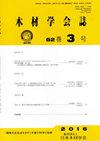Seismic Behavior of CLT Shear Walls Connected with Tensile Bolted Joints and Screwed Steel Joints
IF 0.1
4区 农林科学
Q4 MATERIALS SCIENCE, PAPER & WOOD
引用次数: 2
Abstract
In order to provide the mechanical properties and seismic performance of CLT shear walls to which tensile bolted joints and screwed steel joints were applied for vertical restraint, cyclic lateral loading tests and pseudo-dynamic tests were conducted on 3-ply sugi CLT shear walls. Moreover, the analytical model was validated by comparing the time-history earthquake response analysis and pseudo-dynamic test results for these types of shear walls. The relation between the magnitude of input ground motion and the horizontal displacement response was investigated by conducting time-history earthquake response analysis on several earthquake records and artificial waves with variable magnitude of input ground motion. Also, the possibility of replacing the tensile bolted joints by screwed steel joints was discussed. The yield strength and the maximum strength of shear walls with screwed joints were 20% higher than those with tensile bolts in the cyclic lateral loading tests. With the same seismic wave input in the pseudo-dynamic tests, the maximum response displacements of screwed joint specimens were smaller than those of tensile bolt specimens. Furthermore, the response displacement of earthquake response analysis showed good agreement with pseudo-dynamic test results. It is suggested that CLT shear walls with screwed steel joints give enough performance compared to shear walls with tensile bolt joints.CLT剪力墙受拉螺栓连接和螺纹钢连接的抗震性能
为了提供竖向约束采用拉伸螺栓连接和螺纹钢连接的CLT剪力墙的力学性能和抗震性能,对3层薄壁CLT剪力墙进行了循环侧载试验和拟动力试验。通过对剪力墙的时程地震反应分析和拟动力试验结果的对比,验证了分析模型的有效性。通过对几种地震记录和变震级输入地震动人工波进行时程地震反应分析,探讨了输入地震动震级与水平位移响应的关系。讨论了用钢螺纹连接代替拉伸螺栓连接的可能性。螺纹连接剪力墙的屈服强度和最大强度比螺栓连接剪力墙高20%。在相同地震波输入的拟动力试验中,螺纹连接试件的最大响应位移小于张拉螺栓试件。地震反应分析的响应位移与拟动力试验结果吻合较好。结果表明,与螺栓连接剪力墙相比,钢螺纹连接的CLT剪力墙具有足够的性能。
本文章由计算机程序翻译,如有差异,请以英文原文为准。
求助全文
约1分钟内获得全文
求助全文

 求助内容:
求助内容: 应助结果提醒方式:
应助结果提醒方式:


